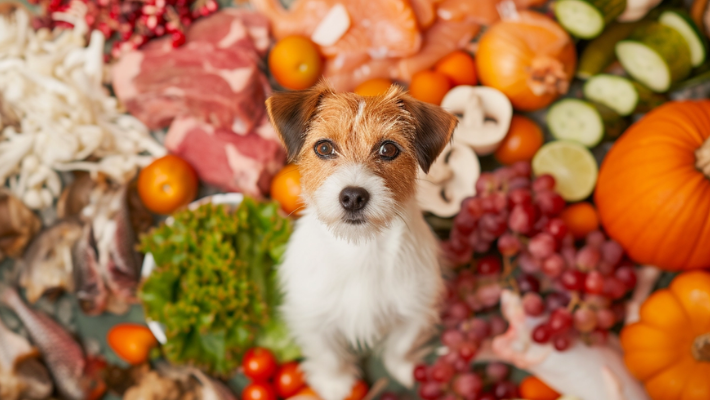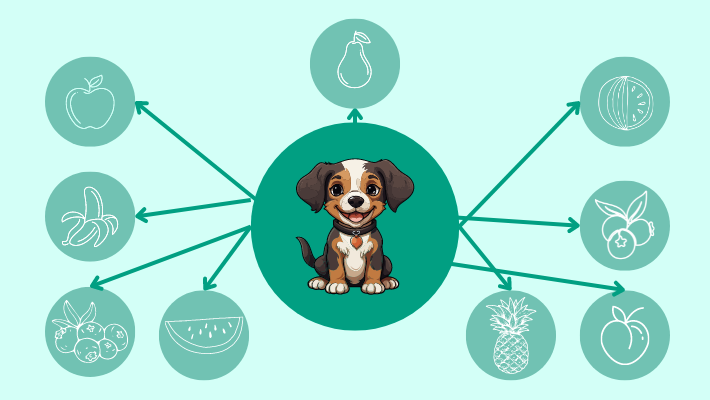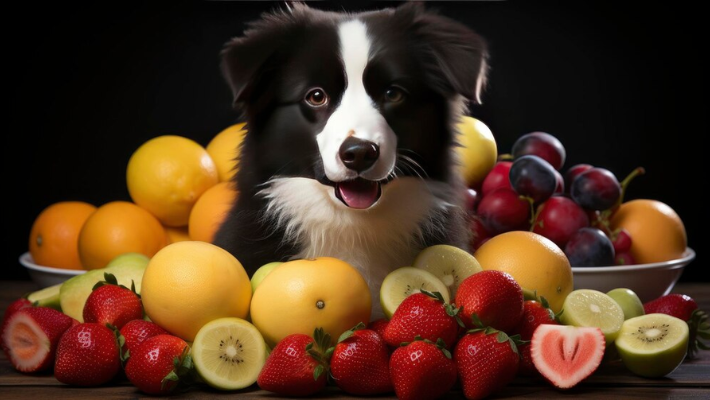Time For Some Fruit Treats: What Fruits Are Good for Dogs


Think about this for a moment: You have just sat down to enjoy a refreshing bowl of fruit salad, and your dog is right there in front of you, begging you to share your fruit salad with them. Is this relatable?
Is it making you wonder that you have a weird pup that loves snacking on fruits? Because whoever has heard of dogs eating fruits, right? They are descendants of wolves and are supposed to be carnivores who love to eat only meat and other animal products.
Well, let us tell you that is not the case. Dogs are actually omnivores, not carnivores. Which means they get all their essential nutrients from both plants and animals. So, dogs can certainly have fruits, and it can be a part of their daily diet. However, not all fruits are safe for your dogs.
In this article, we will explore the topic of dogs and fruits. We will talk about what fruits are good for dogs, which fruits are not safe for dogs, and the benefits of fruits for dogs. Let’s jump right in.
Can Dogs Have Fruits?
Before we delve into the world of fruits and cab, it’s crucial to understand a dog’s dietary needs. A lot of people think that dogs are carnivores, probably because they are descendants of wolves, who are obligate carnivores. The fact that dogs have sharp teeth designed to tear meat easily and behavioral traits like digging and hiding food has led people to assume that dogs are carnivores.

However, domestic dogs have evolved to have a more varied diet, and their digestive system has also adapted. They have longer intestines than obligate carnivores like cats, but they are shorter than herbivores. This allows dogs’ stomachs to process a wider range of foods, including carbohydrates and plant-based nutrients.
But even though the digestive system of modern dogs has evolved to break down starches and process vitamins and minerals found in plants, their bodies are designed to thrive on a diet rich in animal proteins.
However, they can also benefit from certain fruits and vegetables. If you are still not sure about giving fruits to your dog, read on to find out the benefits of feeding fruits to dogs.
Benefits Of Feeding Fruits To Dogs
Incorporating fruits into your dog’s diet can provide a range of health benefits. Many fruits are packed with essential vitamins, minerals, and antioxidants that can support your dog’s overall well-being.
For example, fruits like bananas are an excellent source of potassium, which helps regulate blood pressure and maintain healthy kidney function. Strawberries, on the other hand, are rich in vitamin C, which boosts the immune system and promotes healthy skin. By including fruits in your dog’s diet, you can contribute to their overall health and longevity.

As you can see, there are several benefits to feeding fruits to dogs. We have discussed some of these benefits in detail below:
Vitamin And Mineral Boost
Fruits can provide essential vitamins and minerals that complement a dog’s regular food. For example, blueberries are packed with antioxidants, apples offer vitamins A and C, and watermelon is a great source of hydration.
Digestive Health
Some fruits, like pumpkin and papaya, are rich in fiber, which can aid digestion and regulate bowel movements, especially if your dog experiences occasional constipation.
Weight Management
Many fruits are low in calories and fat, making them suitable for dogs on weight management plans. They can provide a satisfying snack without adding excessive calories.
Dental Health
Chewing on crunchy fruits like apples (without the core) can help reduce plaque buildup and freshen your breath, contributing to overall dental health.
Hydration
Fruits with high water content, like watermelon or cantaloupe, can be a refreshing and hydrating snack, especially during hot weather.
But remember that you should always give fruit to your dog in moderation and as an occasional treat, not as a main part of their diet.
What Fruits Are Good For Dogs?
Now that you know eating fruits can be beneficial for your dog’s overall health let’s take a look at what fruits are good for dogs:

Apples
These fruits are a great source of vitamins A and C, as well as fiber. Just be sure to remove the apple core and seeds first, as the seeds contain small amounts of cyanide, which can be harmful to dogs in large quantities.
Bananas
Packed with potassium and fiber, bananas can be a healthy occasional treat for most dogs. Just remember to remove the peel and offer small, bite-sized pieces to prevent choking hazards. Also, be aware that too much potassium can be harmful, so limit your banana intake to no more than one small banana per day.
Blueberries
These little berries are loaded with antioxidants, which can help protect your dog’s cells from damage and may even reduce the risk of certain diseases. They are also a great source of fiber for dogs, which can aid digestion and promote gut health in your dog. Blueberries also make a great low-calorie treat option for dogs. You can freeze them for an extra refreshing summer treat.
Cantaloupe
This particular melon is high in water content, making it a hydrating and nutritious snack for dogs during the hot summer months. It also contains vitamins A, K, and C along with Potassium and fiber, which is also very good for a dog’s health. Just be sure to remove the rind and seeds first. Also note that cantaloupe does contain sugar, so avoid giving large amounts to prevent digestive upset.
Cranberries
Cranberries can be a good source of vitamins and antioxidants for dogs, which can help boost your dog’s immune system and may reduce the risk of certain diseases. However, cranberries are tart and sour, so not all dogs will enjoy them. If you do give your dog cranberries, be sure to offer them dried and unsweetened.
Peaches
They are a good source of vitamins A and C, as well as fiber. However, the pit of a peach contains trace amounts of cyanide and can be harmful to dogs, so be sure to remove it before giving your dog any peach.
The stems and leaves can also contain small amounts. Discard these parts completely before offering any peach to your dog. You should give fresh peaches to your dog whenever possible instead of canned peaches, which contain added syrup or sugar.
Pears
Pears are a good source of fiber, minerals, and vitamins K & C that can benefit your pup. They also have low-calorie content, which makes them a suitable treat option for overweight dogs. However, the core and seeds of the pear fruit contain a compound called amygdalin that releases the toxin cyanide in the digestive tract after being swallowed. So be sure to remove them before giving your dog a pear.
Watermelon
Watermelon consists of around 92% of water. Which is why it is a great source of hydration for dogs on a hot day. It is also packed with a lot of essential nutrients, including potassium, copper, and Vitamins A, B6, and C, which are beneficial for your dog’s immune system and overall health. Watermelon also contains some fiber and antioxidants, but the quantity is quite low compared to other fruits. Just be sure to prepare the fruit properly for your dog. Make sure to remove the seeds and rind first and cut them into small bite-sized pieces for your dogs.
Pineapple
Pineapple can be a healthy treat for dogs in moderation. It contains vitamins, minerals, and digestive enzymes that can reduce inflammation and aid digestion. However, too much pineapple can cause diarrhea, so be sure to start with a small amount and see how your dog tolerates it.
Fruits To Avoid Giving To Dogs
While many fruits are safe for dogs, there are some that should be avoided. Here’s a list of fruits that are definitely not safe for dogs to eat:

Grapes And Raisins
These fruits are highly toxic to dogs and can cause serious health issues, including kidney failure. For a long time the exact reason why grapes and raisins are harmful to dogs was unknown, but recently, veterinarians at the ASPCA poison control center figured out that tartaric acid is the toxic compound present in raisins and grapes. Even a small amount can be dangerous, so avoid them completely.
Cherries
The pits, stems, and leaves of the cherry fruit contain cyanide, which is poisonous to dogs. Note that even a single cherry pit can be harmful, especially in the case of smaller dogs. Hence, make sure to keep your pups away from cherry fruits. However, the flesh itself may not be harmful in small amounts. But cherry fruits have quite a high sugar content, so it’s best to avoid them altogether to be safe.
Avocados
The toxin called Persin present in avocados can cause vomiting, diarrhea, and even heart issues in dogs. This toxin is present in the flesh, skin, and pit of the avocado. This fruit is also high in fat content, which can lead to pancreatitis.
Citrus Fruits
While not necessarily toxic, citrus fruits are highly acidic, which can cause stomach upset in dogs. The flesh of these fruits (oranges, grapefruits, clementines, and even lemons and limes) is not poisonous to dogs. However, the peel, seeds, and leaves contain a high amount of citric acid and psoralens which can be harmful to dogs if ingested in large amounts. Furthermore, the peels and seeds can be a choking hazad for dogs.
Crab Apples
These are a type of apple that is smaller and more tart than regular apples. While they are not toxic to dogs, they can cause gastrointestinal upset due to their high acidity. It is best to avoid feeding your dog crab apples to prevent any digestive issues. Stick to regular apples, which are safer and more enjoyable for your furry friend.
Things To Keep In Mind While Giving Fruits To Your Dog

While fruits can offer health benefits to dogs, there are some precautions and considerations to keep in mind. These are as follows:
- Know what’s safe and what’s not: Thoroughly familiarize yourself with the fruits that are toxic or can cause digestive issues in dogs (e.g., grapes, raisins, cherries, avocados). Avoid these fruits altogether.
- Remove pits, seeds, and rinds: These can be choking hazards or contain harmful compounds. For example, apple cores contain small amounts of cyanide, and avocado pits contain persin, which is toxic to dogs.
- Start slow and monitor: When introducing any new food, including fruits, begin with a tiny amount and observe your dog for any signs of digestive upset like vomiting or diarrhea.
- Treats, not staples: Fruits should be occasional treats, not a significant part of your dog’s diet. Their primary source of nutrition should come from well-balanced dog food formulated for their age and activity level.
- Sugar content: Many fruits, such as mangoes, pears and pomegranates, are high in sugar, which can lead to weight gain, dental problems, and even diabetes in dogs if given in excess.
- Digestive issues: Too much fruit can cause digestive upset in some dogs, especially those with sensitive stomachs. Stick to small portions.
- Consult your vet: If your dog has any underlying health conditions or allergies or is on medication, talk to your veterinarian before introducing fruits to their diet.
How To Introduce Fruits To Your Dog’s Diet

Here’s a guide on how to safely introduce fruits to your dog’s diet:
Preparation Is Key
Stick to the list of dog-friendly fruits you compiled earlier. Avoid anything potentially toxic or with choking hazards, like pits or large seeds. Make sure to wash the fruit thoroughly to remove any dirt or pesticides. Cut it into small, bite-sized pieces to prevent choking. Remove any pits, seeds, or rinds that might be harmful.
Introducing The Fruit
When you are giving some fruit to your dog for the first time, offer a minuscule amount of fruit; it can literally be the size of a pea or slightly bigger. Let them lick the piece and see if they like the taste of the fruit. If they like it then you can start by giving them small amounts of the fruit and then gradually increase the amount. This allows your dog’s system to adjust and avoids overwhelming their digestion.
Supervise Closely
The first time your dog tries a new fruit, watch them carefully for any signs of discomfort or allergic reaction. Signs to look for include vomiting, diarrhea, lethargy, or excessive scratching.
Observe For Reactions
Wait at least 24 hours after offering the fruit to see if your dog experiences any digestive upset. If everything seems normal, you can proceed with a slightly larger amount the next time. If there are no negative reactions, gradually increase the amount of fruit offered over several days. Remember, even safe fruits should be given in moderation.
Making It Fun To Eat
You can give them small pieces of raw fruits or mash them up and mix them with your dog’s regular food for a change of texture and taste. On a hot day, frozen fruit pieces can be a refreshing and healthy snack. Simply freeze small chunks of dog-safe fruits for a cool and stimulating treat.
You can also whip up some delicious treats for your pup using any of the safe fruits for dogs. For instance, you can bake pumpkin and apple muffins or make frozen yogurt and fruit bars.
Lastly, consult with your veterinarian before introducing any new foods to your dog’s diet to ensure it align with their specific needs and health conditions.
Final Thoughts
Thus, as you can see, fruits can be a healthy and nutritious addition to your dog’s diet when given in moderation and as a supplement to their regular meals. Fruits like bananas, strawberries, and apples offer numerous health benefits, including essential vitamins, minerals, and antioxidants.
However, it’s crucial to avoid toxic fruits like grapes and raisins and always remove seeds and cores from apples. Remember to introduce fruits gradually, monitor your dog’s reactions, and consult with your veterinarian to ensure your furry friend’s optimal health and well-being.
ADDITIONAL READING:









Leave A Comment